Borderline personality disorder (BPD) is a serious mental illness that affects our thoughts, emotions, behaviors and relationships. It is a form of personality disorder that can make you feel like you are on an emotional rollercoaster ride due to rapidly changing moods. Let’s take a close look at the symptoms of borderline personality disorder.
What is Borderline Personality Disorder (BPD)?
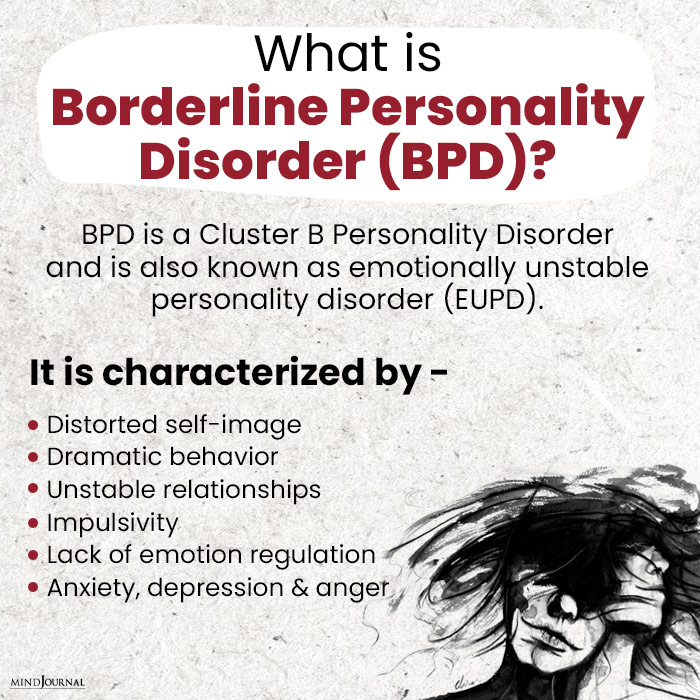
Borderline personality disorder is a psychiatric condition that affects how we think and our ability to manage our own emotions. It can severely impair our daily functioning by impacting our emotion regulation abilities.
BPD is marked by poor self-image, impulsive behavior, mood swings, negative thought patterns, difficulty controlling emotions and unstable relationships. A person suffering from BPD may also be prone to self-injury and suicidality.
It is also known as emotional intensity disorder (EID) and emotionally unstable personality disorder (EUPD). However, there may be some debate regarding the use of these alternate terms for BPD.
Related reading: Understanding BPD
Researchers explain that BPD often involves the following characteristics-
- Fear of abandonment
- Feelings of emptiness
- Chronic dysphoria or depression
- Heightened risk-taking behaviors
Sufferers are often afraid of abandonment, feel insecure and find it hard to cope with loneliness. However, negative behavior patterns, like mood swings, impulsivity and anger makes it hard for them to develop close relationships. Onset often occurs during early adulthood, but the symptoms can get better in later life.
Treatment can help to relieve symptoms and enable someone suffering from borderline personality disorder to live a satisfying and healthier life.
Symptoms of Borderline Personality Disorder
People struggling with BPD tend to experience instability, uncertainty and rapid mood swings. Their relationships are usually unstable as their feelings change from liking someone to becoming intolerant of that person very quickly.
They see everything in extreme and act recklessly. However, as some of the symptoms of borderline personality disorder are similar to the signs of bipolar disorder, identifying BPD can be a bit confusing.
If you suspect that you or someone you know is suffering from BPD, then here are some of the most common borderline personality disorder symptoms and signs –
1. Severe mood swings
If you are coping with BPD, then you are prone to experiencing frequent mood swings and these episodes of variable moods may last for a few days. You may feel a wide range of moods and emotions in a short period of time, changing from anxiety, joy, guilt, hatred, uncontrollable anger, love, shame, fear or irritability.
These emotional changes can occur suddenly and rapidly leaving you feeling unstable and uncertain. This can affect how you interact with others, lash out at your loved ones and find it difficult to control difficult emotions.
Related reading: 10 BPD Facts Everyone Should Know
2. Intense fear of abandonment
People struggling with borderline personality disorder have a strong fear of being left alone, separated or getting rejected by others. They take a lot of effort to avoid perceived or real abandonment. This makes them build and end new friendships and relationships quickly.
They may spy on the people they love, constantly track their whereabouts or try to manipulate them to prevent break ups or relationship dissolutions. Contrarily, they may push someone away if they feel they are becoming too close, in order to avoid rejection.
3. Explosive outbursts
Uncontrollable and sudden anger outbursts are commonly experienced by people with BPD. You are likely to have a short temper and struggle with controlling extreme anger as a sufferer.
Once your anger is triggered, you become consumed by rage and start shouting and throwing anything you can grab. It should be noted that this anger is probably directed more at yourself than at others.
Related reading: The Temper Tantrums Of Borderline Personality Disorder
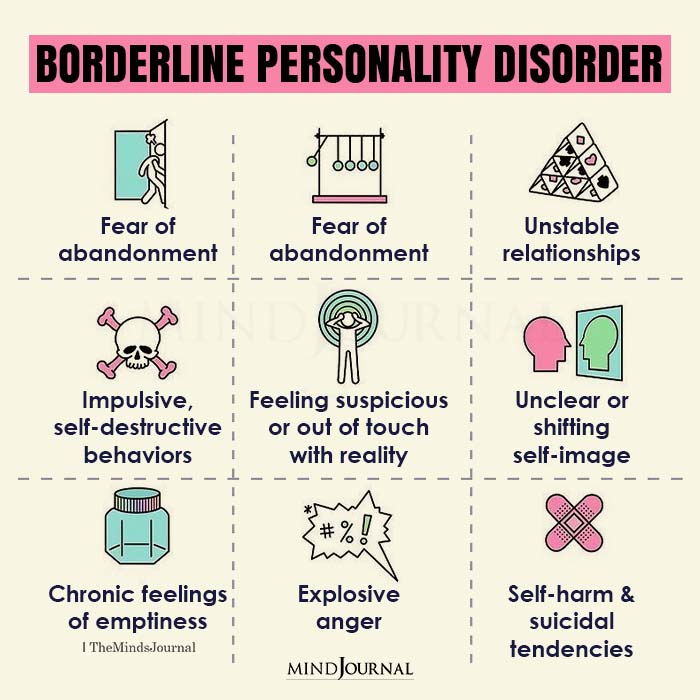
4. Impulsive & risky behavior
People with borderline personality disorder are prone to impulsivity and often engage in dangerous behavior. They are highly likely to drive recklessly, gamble, fight, have unsafe sex, and engage in drug abuse, binge eating, spending sprees etc.
If you have BPD, you may also engage in self-destructive behavior and sabotage your relationships, career and happiness. However, such reckless behavior is typically difficult to control for the sufferer.
5. Poor self-image
People with BPD have a constantly shifting and unstable sense of self. You will experience frequent changes in how you see and feel about yourself. One day you may hate your entire being while the very next day, you may feel good and proud of yourself.
You struggle with having a clear idea about yourself or what you want your life to be. Hence, you constantly move through relationships, friendships, jobs, goals, values, identity and even sexual preferences.
Related reading: This Is What A Personality Disorder Really Looks Like: Symptoms To Watch Out For
6. Difficult relationships
Individuals suffering from borderline personality disorder tend to have short-term and intense relationships. Although you may be quick to develop relationships, you also experience constant disagreements, conflicts and frequent break ups. You will either have a perfect or a toxic relationship, as your thoughts are focused on extremes.
However, due to your constant mood swings, you may hate your loved ones in one moment and feel a deep connection with them in the very next one.
People with BPD also have a strong fear of being abandoned by the people they love. Hence, they find it difficult to trust people they love, which leads to stress in the relationship.
Related reading: What To Expect From A Relationship With Someone Who Has A Personality Disorder
7. Suicidal behavior
People with borderline personality disorder are highly prone to engage in self-harm and suicidal behavior. You may try to injure yourself physically without having any intention of committing suicide. You may injure, burn or cut yourself at times. You may also have frequent thoughts of suicide and may even attempt suicide.
Such dangerous behavior is often fueled by a distorted self-image and leads to shame and guilt. You may also engage in self-sabotaging behavior and may ruin your own career and relationships intentionally.
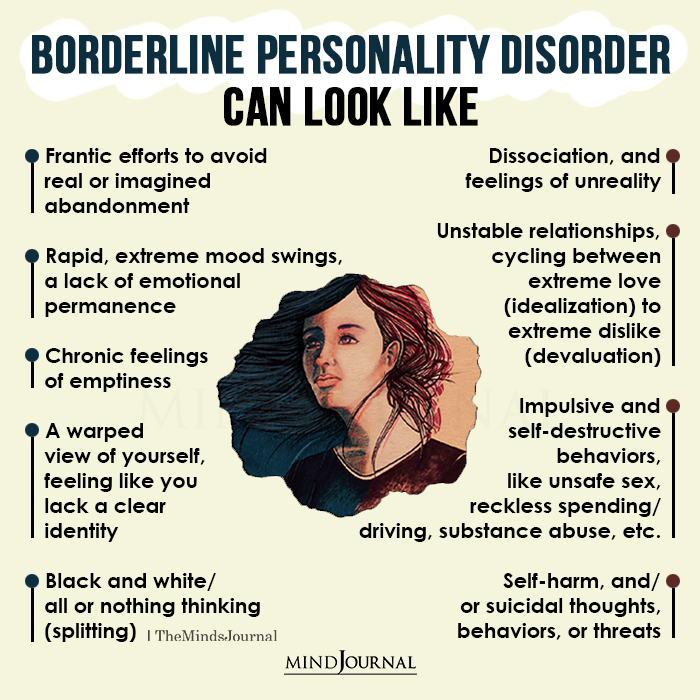
Other signs of borderline personality disorder
Apart from the ones mentioned above, there may be some other signs of BPD that can be observed in a sufferer. Some of them are mentioned below –
- Persistent feelings of emptiness
- Paranoia and suspicious thoughts
- Feeling out of touch with reality
- Dissociation or feeling disconnection with one’s own body
- Stress-related changes in thoughts
- Depression and self-loathing
Related reading: Traits Of Cluster B Personality Disorder
Coping with borderline personality disorder
Living with BPD can be surely challenging, not only for the sufferer but also for their family and friends. However, consulting a doctor and seeking medical help can help you or your loved one manage BPD symptoms and live a healthier life.
A doctor can help develop an effective borderline personality disorder treatment plan involving therapy, counseling and medications based on a medical diagnosis.
So it is important that you work with your doctor, follow the treatment plan and take steps to improve your mental health so that you can function normally in your daily life, build positive relationships and improve your mental and emotional well-being.
Related reading: How To Cope When Someone You Love Has BPD
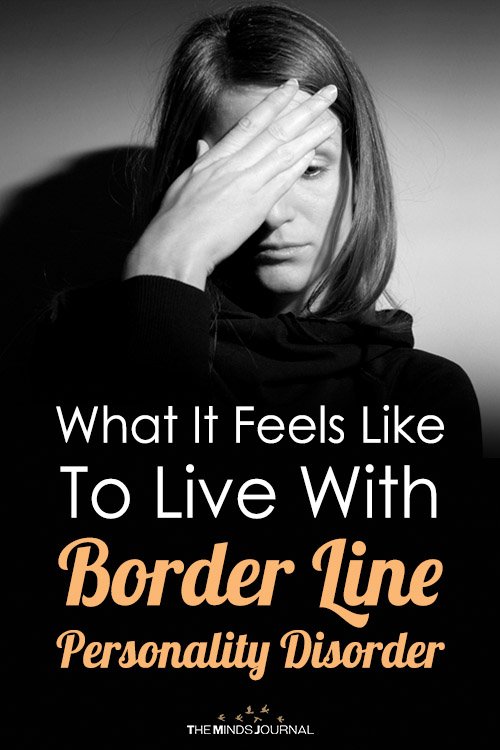

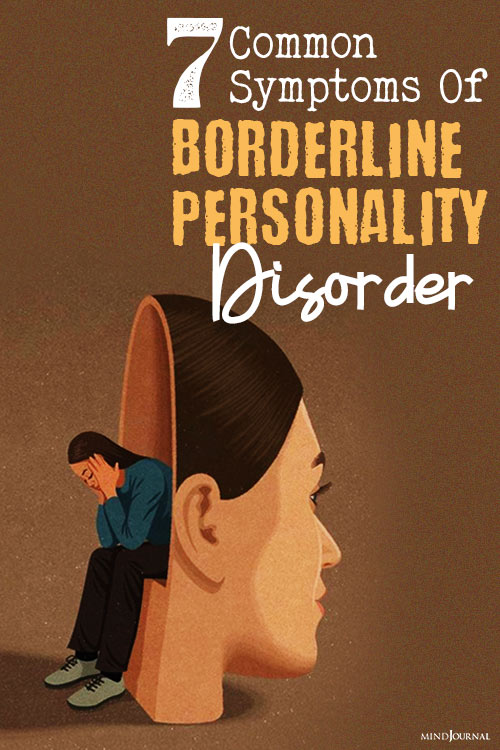

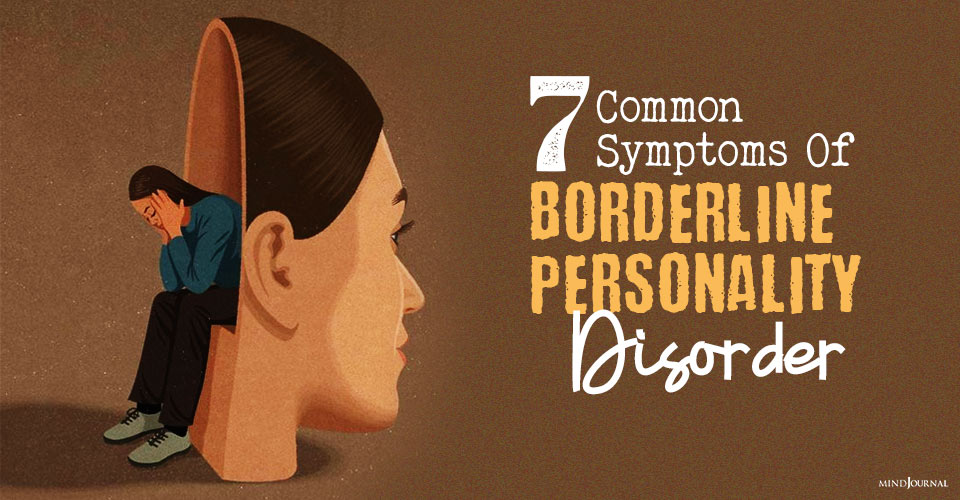







Leave a Reply